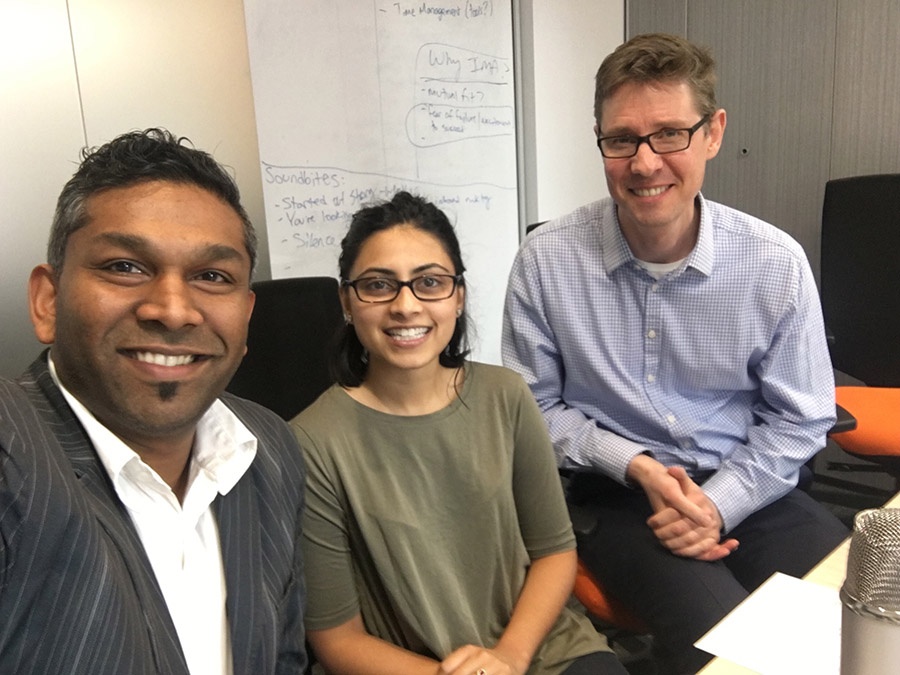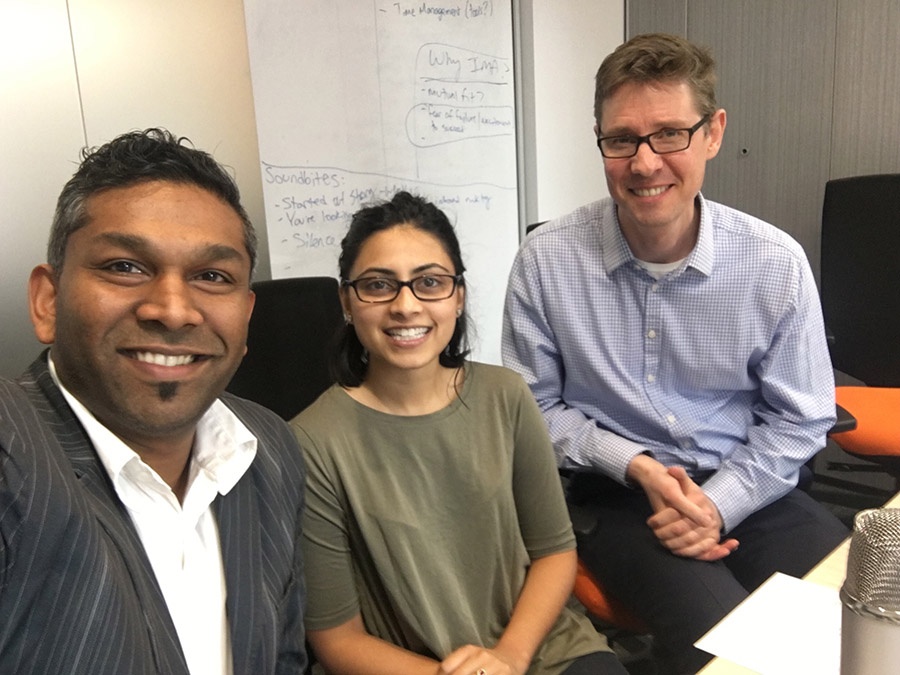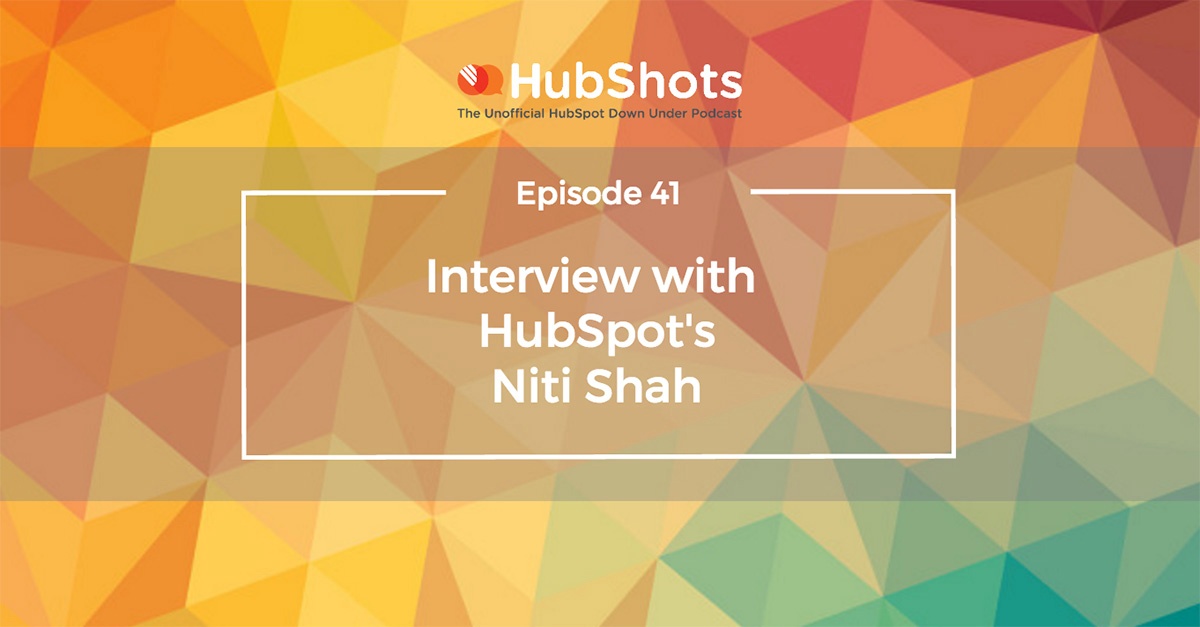Episode 21: Strategic Marketing with Ryan Bonnici
Welcome to Episode 21 of HubShots! Interview: Remarkability with Ryan Bonnici (@ryanbonnici) - HubSpot Marketing Director Asia Pacific and Japan ...

Recorded: Friday 26 June and Tuesday 05 July 2016
Click here to join the HubShots WhatsApp group.
In this episode we interview Niti Shah (LinkedIn), Senior Marketing Manager at HubSpot Southeast Asia and discuss her experiences, learnings and advice from being part of a larger marketing team through to setting up HubSpot's Singapore office.
There's tons of useful takeaways on all stages of the funnel (top, middle and bottom) as well as advice for understanding cultural differences, and her insights on running HubSpot's Product Hunt campaign - one of the most successful lead generation campaigns ever.

Full transcript of the interview:
Niti Shah: Sure, so I have been at HubSpot for three years now. I started in the headquarters office in Cambridge, when all the marketing team fit into one little room. And since then, we've expanded, and I have been along for the journey. So I helped the Sydney team get off the ground last year, and then I just moved to Singapore to do the same there and build the marketing out.
Ian Jacob: Excellent. Now, a lot has changed in three years. What has been the biggest thing that you've seen change? I know you've traveled pretty much across three continents.
Niti Shah: One of the biggest changes that I've noticed is that I don't recognize every face anymore on the team. There's always an influx of new people every time you go back to Cambridge or even when you come back to Sydney. It's really exciting, because it shows how fast the team's growing and how the company's growing.
Craig Bailey: The growth has been massive here. We've just noticed in the last year. Because your office, you've changed... Suddenly, all these empty desks we saw a couple months ago are all filled. It has been massive, hasn't it?
Niti Shah: Yeah. It was so quiet here last year, but it's amazing that now we're already starting to grow out of this space.
Ian Jacob: Have you seen a change in your role in the way that you're focused, perhaps?
Niti Shah: Yeah. As we get more teams, people get more specialized. So I have noticed that it gives you the chance to get deeper into a skill instead of trying to always wear multiple hats. So there's that pro. My role has been interesting, because I have been in startup mode with the new offices. So you'll notice that they're at the beginner HubSpot phase, where all the marketers are doing multiple things. And then in some of the more mature offices, they're quite specialized.
Craig Bailey: Interesting. And so when you say you've become more specialized, are there particular areas that you have been particularly drawn to?
Niti Shah: Recently, I've been specializing quite a bit in organic search and top of the funnel, and that's just reacting to where we are in the market. As I was talking to Ian before, I was saying that Singapore in terms of adoption for digital strategies is about two and a half years behind where the U.S. is with marketing. Not to say that they're not on top of technology. In some ways, they've actually completely bypassed it by switching much faster to one-to-one apps. And they're using more advanced technology, but then the marketing side of it is still a little bit behind. So we realized that the first thing we have to do was get found, “search and be found”. And so I needed to start really get honing in on the SEO strategy, yeah.
Ian Jacob: Yeah, that's really interesting. Now, if people are starting off, like you had done, it looks like a few times, tell us some of the key things that people need to account for.
Niti Shah: I would say the biggest thing is what we call smarketing at HubSpot, and that's sales and marketing alignment. If you just go off in marketing land and say, "I'm gonna do X, Y, Z," even though it's very valid and very important, the first thing in any new business is to talk to sales and make sure that their immediate problems are solved for before you start solving for the endgame.
Ian Jacob: Okay, that's really interesting. Now, what if people don't have a sales team?
Niti Shah: So, for example, for agencies, you really need to do the research first. Know your market. One thing we learned in Singapore that was a little late in the game was that the government offered so many types of grants to small to medium-sized businesses for improving their companies, so everything from grants to work with agencies, get consulting, a ton of grants for software. And not knowing that actually held us back a little bit, and now we're making up for lost time. But that would've been a really good edge for us. When we're entering a market, it would have helped close more deals if we had been able to leverage those tools that the government had out. So even though that doesn't necessarily fall into, say, marketing, it's something that you have to think about as an overall strategy first.
Craig Bailey: That's a fantastic tip. And most marketers wouldn't. They'd be just focused on, oh, what's the next social channel, and you're looking at, yeah, geographic and, yeah, governmental effective subtext. Can I come back to an earlier question? Talking about specializing and focus, you mentioned top of the funnel, and in the Grow with HubSpot event, that was really clearly defined, your marketing is broken up into top of the funnel, middle of the funnel, bottom of the funnel, and you've got specialists across that. Now, is that something that you have to get to a particular size before you can really think about, or is it something you should be thinking about early?
Niti Shah: I think it's early. As soon as you have even three people, you can specialize. That's a lot of times how we break up our new teams. We'll start with one or two people that do all of it. And then we'll hire people who start specializing in each of those, because it helps to have someone with that experience bringing that into our team. So we just made a hire to really attack the bottom of the funnel, and we call that sales enablement. And so that person is really responsible for that smarketing piece that we were missing - talking to sales, making sure that we have the right materials for that, making sure that the government grants are well-defined and across so that reps can then leverage them, things like that that we weren't specialized in or couldn't have done without someone that we bring onto the team. I think even if it's just a one-person team, you need to still think about your activities in top, middle, and bottom. But you don't necessarily have to do it all. You need to pick what's important first. And they're all valid, but you need to prioritize. And I think that's the biggest lesson for small teams.
Ian Jacob: That is really good. Now, can I ask you, how do the three people doing top, middle, bottom...do they interact every day? What's the interaction like? Do you all kind of just do your own thing? And obviously, you all talk together. But how closely is that interaction?
Niti Shah: Well, let me tell you, it was just me in Singapore. So I'm a marketer talking to myself. And everyone else was based in Sydney or abroad somewhere else. You do end up still talking to everyone quite a bit, especially on the smaller teams. I will say that I noticed in Cambridge, people at the top of the funnel might not necessarily be talking to sales enablement very often. Their paths just don't cross, because there's so much being done at each stage that there's not necessarily day-to-day communication. But people are pretty good about... The managers will stay in touch and make sure that everyone's across projects that maybe affect both teams, for example, yeah.
Ian Jacob: All right, so in your experience, what things that you've done have been successful?
Niti Shah: One interesting thing that we did, we launched a tool on Product Hunt. So, sometimes, even at HubSpot, you get into this bad habit of just sticking to what you know. And it was the same old, "Hey, let's run a campaign. Email, and we'll do some social media, and we'll do cold marketing, and we'll do influencer outreach," which is all great. But we were holding ourselves back. And so I fell into that trap, and my manager actually was like, "Niti, there's a thing called Product Hunt. I know you use it. Why don't we do something with it?" I said, "No. That's not my job. I'm here to get more leads for ANZ." And I pushed back quite a bit, but eventually, it was like, "Okay, let's just do this." So he decided... Basically, what I did is I researched the heck out of Product Hunt. And with any newer platform, there wasn't actually much out there. So we had to go off of a couple inferences and say, "Okay, there's not necessarily KPIs. I don't exactly know what to expect, so I'm just gonna set a bunch of metrics, and maybe it'll happen," and hopefully, I understood it well enough.
So then, with Product Hunt, we had to pick the right tools. So a lot of times in marketing, you just kind of do the same playbook, and it's not always a good fit. With Product Hunt, it was the right product, the right person launching it. We had Dharmesh Shah launch it. I knew that for him this would be pretty special, because it's something that he built ages ago, and then now it's been revamped. He's also quite a big fan of more organic communities like Product Hunt. And then we just made sure to get everyone bought in on it across the company. And the day of just completely...even though it's actually a one-minute thing, right? Dharmesh just posted something up. Spent about a month and a half planning it on top of every other campaign I was doing. And we got 100,000 visits in 3 days. We completely smashed the lead gen records. And it was really exciting, because here's something that if we hadn't done it, we would have probably not noticed. But this tool wasn't getting as much traction, and then this was that big push that was needed to then get it started to get more regular traffic.
Craig Bailey: That's fantastic. Can you talk a little bit more about, because there's the setting up a strategy on Product Hunt, and then there was getting to vote on it? And how did you promote that side, getting support?
Niti Shah: So the thing with Product Hunt is that you can't just lead someone to a link and then get them to upload it. They have to find it themselves. So if people were uploading it from the link I sent them that went straight to that Product Hunt, they would actually be discounted in the algorithm. So things like that that we had to kind of figure out ahead of time, what I did first is I reached out to our CTO, and when you're reaching out to upper levels of management, it can be a little scary and tricky, but I was lucky enough that I've been there for a while now. And I felt comfortable being like, "Hey, do you wanna do this thing?" And with the planning, when you have a stakeholder like that, you need to be flexible. So I built in some extra time knowing that we might have to reschedule a couple of times.
The other people we had to buy in, we had to get buy-in from our campaigns team that controls all of our email channels, all of our customer communications. I reached out to all of my co-marketing partners that I had good relationships with. We got our channel consultants... Maybe they sent you an email, and they're like... Yeah, so we got them reaching out to partners and anyone that we had goodwill with. We don't ask for sharing that kind of stuff too often, so we thought, "Okay, there's only so many times you can do this, and we're going to use up one of our goodwill cards right now." And so it was just getting almost everyone across the company that usually we wouldn't have gotten done, gotten in on the same thing.
Biggest thing was actually working with the product team. We got them on board right away, and they cleared out the servers and made sure that they could integrate traffic. We put some CTAs up there that made sense for the day, like, "Liked us? Go to Product Hunt and give us a vote," and they could then just take that extra step if they wanted. The product team was actually fixing bugs for 12 hours straight. They didn't sleep. It was midnight in Sydney. They were in Dublin. We had Dharmesh over in Cambridge. And, yeah, everyone was just in on it, and that's why it was such a success, yeah.
Ian Jacob: Okay, now, talking about success, we often get asked about ROI, return on investment. How has that evolved over time in your role, being a top-of-the-funnel specialist?
Niti Shah: Yeah, sure thing. It's not always about the leads. And that's something that I found out. At the top of the funnel, there's nebulous things like brand awareness as well. And then that gets into the world of PR.
We realized that people in Singapore, and even ANZ, search differently. So I was measuring myself on “inbound marketing” and realized that people were searching for “digital marketing”, and so we need to change that. And then it was, "How many contributed content articles can we get up? How many co-marketing people can I meet up with?" I actually measured myself on how many coffees a week I had with complete strangers in marketing, because that is such a big part of Singapore and Asia, is that networking. And it came in very handy, because the day of our Grow with HubSpot event, one of our customers had to back out last minute, about two hours before. And I went through, basically, a Rolodex on my phone, which is like, okay... and I called up a couple people. One person just jetted out there, 40 minutes away, showed up. Reuben was one of our customers, and he just completely blew it away. But it's a huge thing, and then they really remember that, and we do, too.
Craig Bailey: So when it comes to sales and marketing alignment, the smarketing piece, do you think culture in a company has an importance or is a factor on how well it's adopted?
Niti Shah: Yeah, I think so, especially when you're coming into a newer office. When we make our sales hires, they're probably coming from more corporate backgrounds. There is this distance between the employee and their manager that can close off communication until they feel comfortable enough. So being cognizant that they are not coming from another place like HubSpot most likely and adapting to their style helps actually open things up a little bit. So I had to observe a lot. I couldn't just go out there and be super American. It really helps when you're not as brash, I guess, is the way I would put it. That can be off-putting if that's not how you've been brought up or how you are culturally. There's a little bit more in terms of gaining someone's respect by following a couple customs, for example, even something as simple as handing someone your business card when you meet them. I now, actually even in Sydney, when I meet new people, I accidentally do a little bit of a bow. It's just little things like that that are really appreciated. And when someone in the office notices that you're adapting to them, and you're not asking them to adapt to your culture, it just completely opens things up both ways.
Ian Jacob: All right, one pearl of wisdom have you learned in the last year? I know because your year just transcended to Sydney and Singapore.
Niti Shah: So many, yeah. One pearl of wisdom is prioritize everything. Before you just take on a project, ask yourself, "Why am I doing this? Is this going to be helping hit immediate results, or is it going to be long-term?" And then rank everything, because you only have so much time on a small team, and every minute matters of your time.
Click here to join the HubShots WhatsApp group.


Welcome to Episode 21 of HubShots! Interview: Remarkability with Ryan Bonnici (@ryanbonnici) - HubSpot Marketing Director Asia Pacific and Japan ...

Welcome to Episode 23 of HubShots! Interview: Sales Enablement with Rosalia Cefalu (@RosaliaCef) - HubSpot Sales Enablement Marketing Manager Recorded

Welcome to Episode 25 of HubShots! Interview: Inbound Marketing with Mads Nielsen (LinkedIn) - HubSpot Principal Channel Account Manager Recorded:...